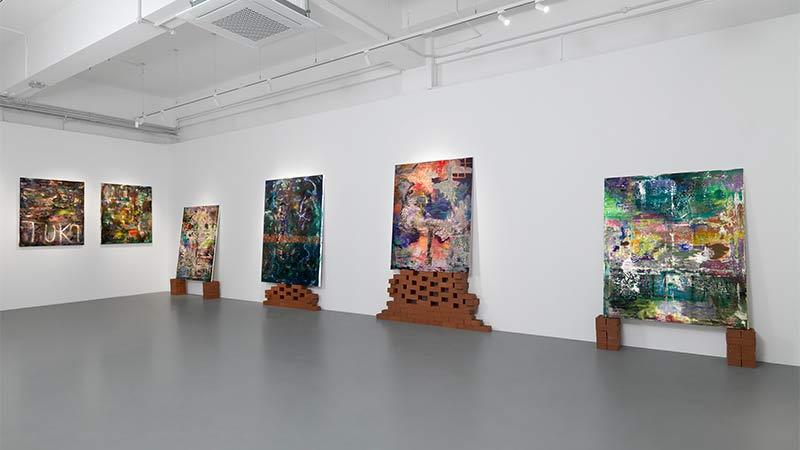This autumn, Venezuelan painter and Westminster graduate Brian De Jesús had his artwork featured in a solo exhibition in the newly opened Hope 93 gallery in London. His art explores migration and collective identity through abstract paintings balanced on breeze blocks common to tropical architecture. Brian shared how his university experience helped him reach this stage in his career.

What does being featured in Hope 93 mean to you?
Hope 93 is dedicated to uplifting underrepresented and unseen artists, and being the first artist with a solo exhibition in this space was a huge honour. This opportunity is deeply meaningful to me, especially as someone who emigrated from Venezuela and worked as a delivery rider to sustain my practice. Hope 93 provided a space for me to reclaim my story and make visible the struggles and resilience of the Venezuelan diaspora. Thanks to the gallery’s support and commitment, my work was mentioned in Vogue during Frieze Week and featured in The Independent UK. I am grateful for the recognition, and I look forward to what is next in our journey together.
What is the inspiration and key messages behind the artwork featured in the gallery?
“La esperanza es lo último que se pierde, Yo también tengo sueños”, which means “Hope is the last thing to be lost, I also have dreams”, is a phrase that, for me, lies in the resilience, hope and need to reclaim my own history amidst the challenges of migration and marginalisation. This work is deeply personal, rooted in my journey of emigrating from Venezuela. I draw from these experiences, along with Caracas’s Tuki culture, to create pieces that embody survival, resilience, and the fragile persistence of dreams in uncertain times.
At its centre, the show is about perseverance, visibility and reclaiming stories that are frequently unseen. Using materials, symbols and language from my personal experience, such as objects of luck, chance and labour, I highlight the sharp contrasts between privilege and precarity, inviting viewers to question what society values and what it leaves behind.
How has your time at Westminster supported you in your career as an artist today?
My time at Westminster was instrumental in shaping my career as an artist. The University provided me with an environment where I could truly explore and develop my practice. With access to well-equipped studios, a wide range of workshops and regular visiting artist talks, I was constantly inspired and encouraged to push my boundaries. The experienced artist-tutors offered invaluable guidance, fostering an atmosphere of exploration and growth that allowed me to experiment and bring new ideas to life.
One of the highlights was a conversation during my first year with Raine Smith, a Senior Lecturer in Fine Art Mixed Media BA Honours. I was working on a highly detailed, photorealistic painting, spending endless hours on a single piece. Raine Smith encouraged me to move beyond photorealism and embrace a more material-based, experimental approach. This push helped me to shift my practice towards what I make and think today.
Why did you choose to study a degree in Art at Westminster?
I never really saw art as a possible path until I moved to London. Visiting museums and galleries, I often felt disconnected as I couldn’t see my own story in the works around me. That sparked something in me, a desire to express myself, to be heard, and to explore my history in a way that felt authentic. Deciding to pursue art was a leap into the unknown, but I knew I needed a place that would give me room to experiment and grow.
Westminster stood out because of its Mixed Media programme, which offered an open, flexible approach that matched my need to explore. The variety of spaces, well-equipped workshops and regular visiting artist talks created a dynamic environment that encouraged me to try new materials and techniques. I chose Westminster because it felt like the right place to build a foundation, not just in skills, but in understanding.
What advice would you give to future artists?
My advice to future artists is to trust in the journey, even if it is uncertain or feels unconventional. Art isn’t a straightforward path. Sometimes, you will feel like you are leaping into the unknown. I didn’t start out with a clear sense of where I was going, but by taking things one step at a time by learning, experimenting and allowing myself to grow, I found my voice.
Another piece of advice is to draw from your own story and experiences, whatever they may be. Authenticity is powerful and the things that make you unique will ultimately set your work apart. Do not be afraid to create from a place of vulnerability and remember that art can be a space to reclaim your history, explore your identity and connect with others who share similar experiences.
Finally, keep exploring and stay open to new ideas. The art world can sometimes feel intimidating but let your curiosity and commitment to your vision guide you. Art has the potential to challenge, inspire and open doors you may not expect, so take that leap and embrace the journey.
Find out more about the Fine Art Mixed Media BA Honours course at Westminster.






